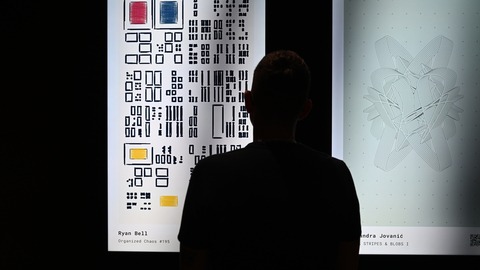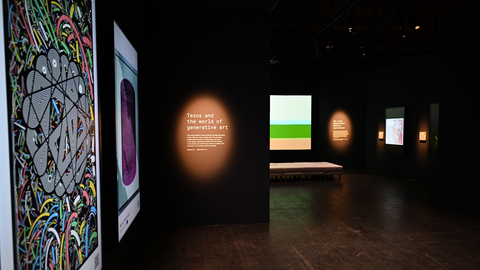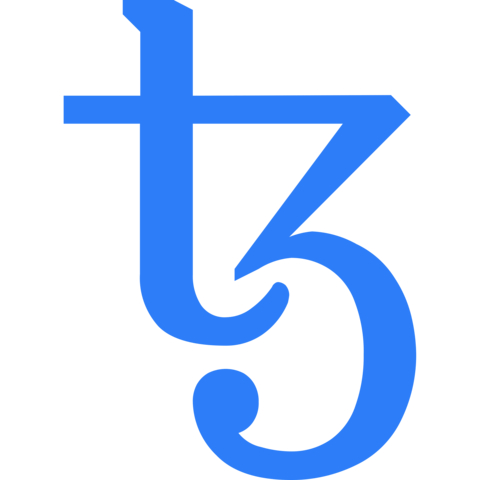BASEL, Switzerland--(BUSINESS WIRE)--The contemporary renaissance of generative art will be in the spotlight at this year’s Art Basel in Basel at the groundbreaking exhibition – Chance Encounters in New Mediums: Generative Art, Presented by Tezos. This unique interactive exhibition from Tezos, an energy-efficient blockchain, will transform generative art into a living artistic process, where the element of chance is celebrated, and etched onto the blockchain.
Chance Encounters in New Mediums: Generative Art, Presented by Tezos will be headlined by generative art pioneer Herbert W. Franke with his 1979 MONDRIAN program courtesy of Herbert W. Franke and Susanne Päch. MONDRIAN is a dynamic generative program created on a TI-99/4, the first 16-bit home computer. On display will be a 21:21 minute sequence of the dynamic generative program captured at a solo exhibition in 2010 at ZKM, now minted as an NFT on Tezos.
The piece will sit at the center of the exhibition space, surrounded by the work of four up-and-coming generative artists. Aleksandra Jovanić, Eko33, Ryan Bell, and Sam Tsao will present generative algorithms which will enable visitors to co-create a new generative artwork that is automatically minted as an NFT and gifted to attendees in real-time.
Blockchains such as Tezos are helping re-imagine the digital canvas for generative artists. As with technology, art is in a constant state of evolution. The exhibition explores the evolutionary intersection between art and technology, where artists everywhere are reimagining what generative art could be in this new medium. The Tezos exhibition invites attendees to step into this world and explore first-hand the role of NFTs in the art world and beyond.
At the core of the exhibition is the generative art platform fx(hash). fx(hash) is a unique tool in the NFT art world, enabling collectors to engage with generative art in a whole new way through the blockchain. fx(hash) will power the interactive element of the installation where fair goers will be able to scan a QR code and set in motion the process of creating a new artwork rendered autonomously by one of the artist’s algorithms. Each interaction with the installation is a chance encounter; an opportunity to trigger the creation of a new generative artwork that is automatically minted as an NFT and gifted to visitors in real-time.
Chance Encounters in New Mediums: Generative Art, Presented by Tezos will also feature a selection of works from pioneering generative artists that represent the global, diverse Tezos NFT art community. Featured artists include Iskra Velitchkova, Marcel Schwittlick, Anna Lucia, Ryan Bell, Sam Tsao, and Eko33.
In addition to the exhibition at the Tezos NFT Lounge in Hall 1, the Tezos art community will host the Tezos NFT Speaker Series in the Art Basel Auditorium. Programming curated by the community will feature representatives from institutions such as HEK Basel, Cortesi Gallery, Light Art Space Foundation, and Galerie Nagel Draxler and artists Marina Abramović, Kevin Abosch, Sasha Stiles, and Linda Dounia.
The speaker series will explore topics ranging from what galleries and museums need to know about Web3 to revealing the secrets of collecting art on the blockchain. The programming will run Thursday, June 16 from 10:00am - 12:00pm; Saturday, June 18 from 10:00am - 12:00pm and 5:00pm - 5:45pm; and Sunday, June 19 from 10:00am - 6:00pm CET. The Tezos NFT Speaker Series will feature the highlighted panels below and more:
NFT Art Trends - Generative Art: An exploration of the generative art landscape in the world of NFTs. Thursday, June 16 at 10:00am CET.
- Lorenzo Cortesi, Art Gallerist at Cortesi Gallery
- Eko33, Generative Artist
- Iskra Velitchkova, Artist
- Paul Schmidt, Growth, fx(hash)
- Hosted by Anna Wolf, Curator
The NFT Is Present: Marina Abramović in conversation with Josef O'Connor. Saturday, June 18 at 5:00pm CET.
- Marina Abramović, Founder, Abramovic Institute
- Hosted by Josef O’Connor, Founder & Artistic Director, CIRCA.ART
The Art Institution's Playbook for NFTs: How can art institutions look to elevate NFT artists and artworks? Join the conversation as these specialists explore everything you need to know about creating, collecting, and displaying NFTs. Sunday, June 19 at 10:00am CET.
- Kristina Leipold, Commercial Director, Light Art Space Foundation
- Elena Zavelev, CEO & Co-Founder, CADAF
- Saskia Draxler, Galerie Nagel Draxler
- Hosted by Alex Estorick, Editor-in-Chief, Right Click Save
Tezos will host an NFT Open House for VIP ticket holders on Wednesday 2:00 - 4:00pm and Thursday 10:00 - 11:00am CET at the Tezos exhibit located across from the Art Basel Auditorium in the Unlimited Hall. The open house will provide VIP fair goers a chance to discuss NFTs and the historical relationship between art and technology.
Tezos’ energy-efficient design and low costs for minting and transacting NFTs have attracted a diverse global community of artists, collectors, and builders. With Tezos home to major NFT platforms such as fx(hash), Objtk.com, and Teia.art, more artists are choosing to create on Tezos than ever before. Sales on Tezos art marketplaces are up 70% in the last 30 days and sales on Objkt.com, the largest marketplace in the Tezos ecosystem, recently eclipsed over $100m in sales in the past year.
Chance Encounters in New Mediums: Generative Art, Presented by Tezos will be on view from June 16-19, 2022, at Art Basel in Basel, at Messe Basel. Please visit artbasel.com/basel for more information.
For more information on fx(hash), visit fxhash.xyz and follow @fx_hash_ on Twitter.
For more information on Tezos, visit Tezos.com and follow @Tezos on Twitter.
Explore the full Tezos NFT Exhibit and Speaker Series at Tezos.com/events/art-basel. All talks will be livestreamed and available post-event.
Press kit and images can be accessed here.
About Tezos:
Tezos is smart money, redefining what it means to hold and exchange value in a digitally connected world. A self-upgradable and energy-efficient Proof of Stake blockchain with a proven track record, Tezos seamlessly adopts tomorrow's innovations without network disruptions today. For more information, please visit www.tezos.com.
About Tezos x Art:
Tezos, an energy-efficient blockchain, has gained global acclaim as the platform of choice for artists and institutions looking to mint NFTs sustainably and responsibly. The Tezos NFT art community is home to a diverse, global network of artists, collectors and builders exploring NFTs as a new medium for creative expression. The Tezos art community has been featured at Art Basel in Miami Beach 2021, Art Basel in Hong Kong 2022, Art Basel in Basel 2022, Venice Biennale 2020, Sonar Festival 2022, SXSW 2022, and more. The Tezos Foundation, a non-profit organization in the Tezos ecosystem, recently established the Tezos Foundation Permanent Art Collection, a $1 million effort to support emerging artists from across the globe – curated by activist and commentator Misan Harriman, Chair of the Southbank Center in London. With Tezos home to major NFT platforms such as fx(hash), Objtk.com, and Teia.art, more artists are choosing to create on Tezos than ever before. The Tezos NFT art ecosystem is the leading NFT market for contemporary art on the blockchain with sales on Tezos art marketplaces up 70% in the last 30 days.
About Herbert Franke:
Herbert Werner Franke, born in Vienna on May 14, 1927, studied Physics and Philosophy there. In 1951 he received his Doctorate in Theoretical Physics. Today Franke is known as the most important post-war German-language writer in the genre of science fiction. Franke is also recognised worldwide as a pioneer of algorithmic art. His intellectual work is based equally on the rationality of the researcher and the creativity of the artist. He is particularly interested in creating aesthetically interesting structures with the help of computer programs. In addition to creating works of art, Franke has also been intensively involved in questions of rational aesthetics. In his "Rational Theory of Art," published as early as the mid-1960s, he described the perception of art as a construct that can be grasped with the help of information theory.
About MONDRIAN
MONDRIAN (1979/2010/2022) is a dynamic program for image and sound developed by Herbert W. Franke for Texas Instruments in 1979. It is named after the Dutch artist Piet Mondrian, who was a pioneer of the constructivism movement in the early 20th Century. Mondrian’s work is characterized by strong horizontal and vertical elements and blocks of color, mostly painted in rich, vibrant tones. The sequence is now minted as an NFT on Tezos.
The program was developed for the Texas Instruments home computer 99/4. It can be used in two ways: First, it permits the selective construction of individual images–in a kind of step-by-step operation as a dynamic sequence in which the user can interactively intervene at any time. Secondly, however, it is also possible to design a “dynamic image,” a sequence of images that changes constantly on its own and whose algorithms run under random influence. In the endless-automatic operating mode, the program also generates algorithmically generated sound effects in parallel as a function of the image structures.
About Aleksandra Jovanić:
Aleksandra Jovanić is an artist and programmer from Belgrade, Serbia, who holds a PhD in Digital Arts and a BSc in Computer Sciences. In her research and artistic practice she combines various media, mainly focusing on interactive art, art games, and generative art. As an assistant professor, she teaches at the new media department at the Faculty of Fine Arts in Belgrade.
About Eko33:
Eko33 is a generative artist who started writing code to create generative artworks and installations in 1999. He made his debuts using a Commodore SX-64 and floppy disks. Since then, his work has been exhibited in Museums, International art fairs, and biennales. His work is focused on nonfigurative, generative art while using custom algorithms and innovative technology.
About Ryan Bell:
Ryan Bell is a lead software engineer, visual artist, and musician living in Las Vegas, NV. He is an active member of Proof Collective (founded by Kevin Rose), and an enthusiast/builder across multiple blockchains in the web3 space. His generative artwork often explores themes of radical complexity, recursion, and playfulness. He describes his process as inventing new software tools to solve interesting technical challenges which yield colorful, sophisticated visual forms. These forms evoke a sense of organic familiarity and chaos as metaphors for the simple pleasures and great adventures of a life well-lived.
About Sam Tsao:
Sam Tsao is a Malaysian creative coder and new music pianist. They have a varied body of works, combining playful interactivity, improvisation with simple shapes as well as vibrant colors. Their works have been shown in Japan, Germany, the UK and Netherlands. Coming initially from the world of classical music, they also collaborate with composers and performers to create audiovisual works. They are currently based in Germany.
About Art Basel:
Founded in 1970 by gallerists from Basel, Art Basel today stages the world's premier art shows for Modern and contemporary art, sited in Basel, Miami Beach, Hong Kong, and Paris. Defined by its host city and region, each show is unique, which is reflected in its participating galleries, artworks presented, and the content of parallel programming produced in collaboration with local institutions for each edition. Art Basel’s engagement has expanded beyond art fairs through new digital platforms and a number of new initiatives such as the Art Basel and UBS Global Art Market Report, Intersections: The Art Basel Podcast and the BMW Art Journey. Art Basel's Global Media Partner is The Financial Times. For further information, please visit www.artbasel.com.





